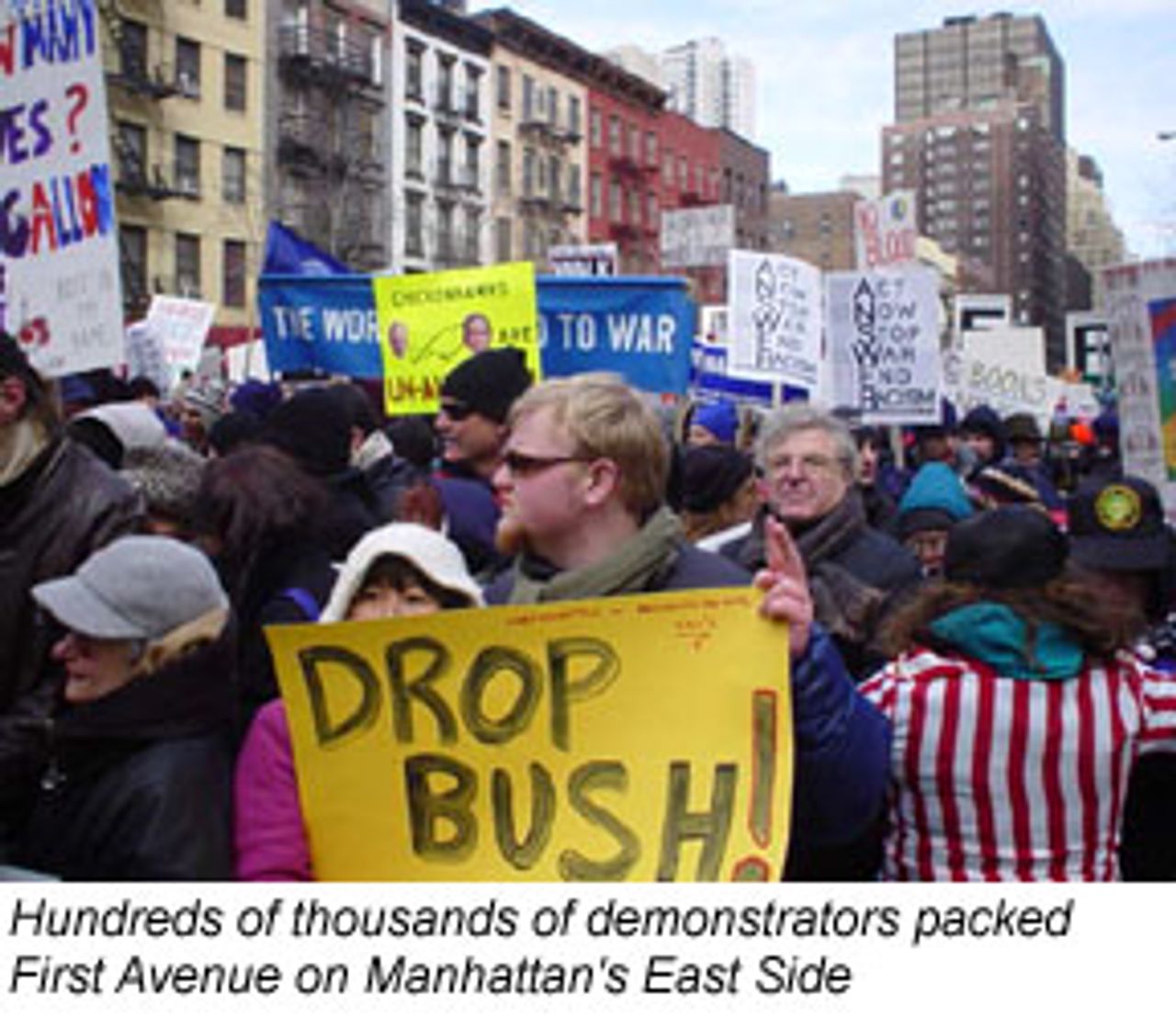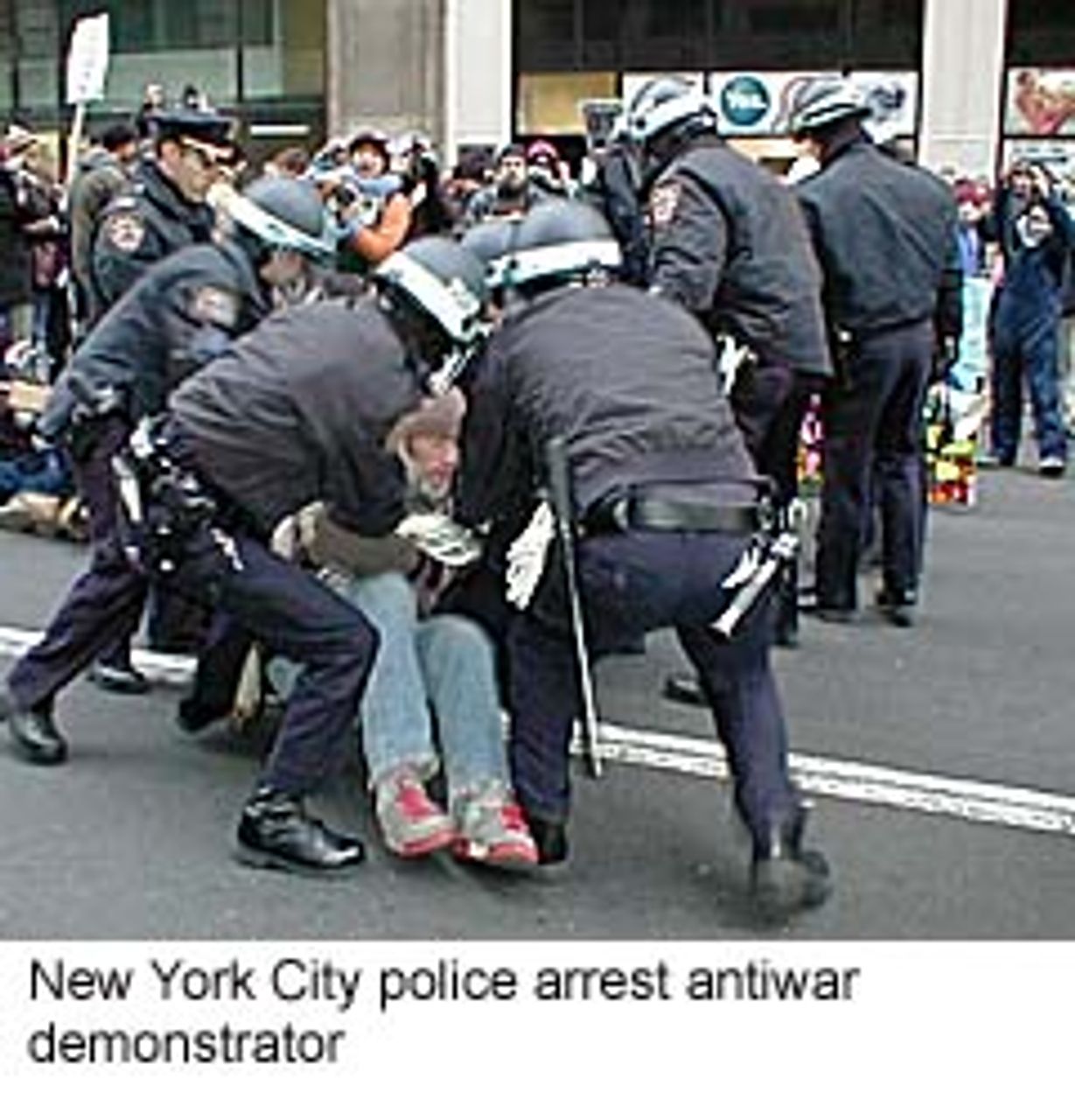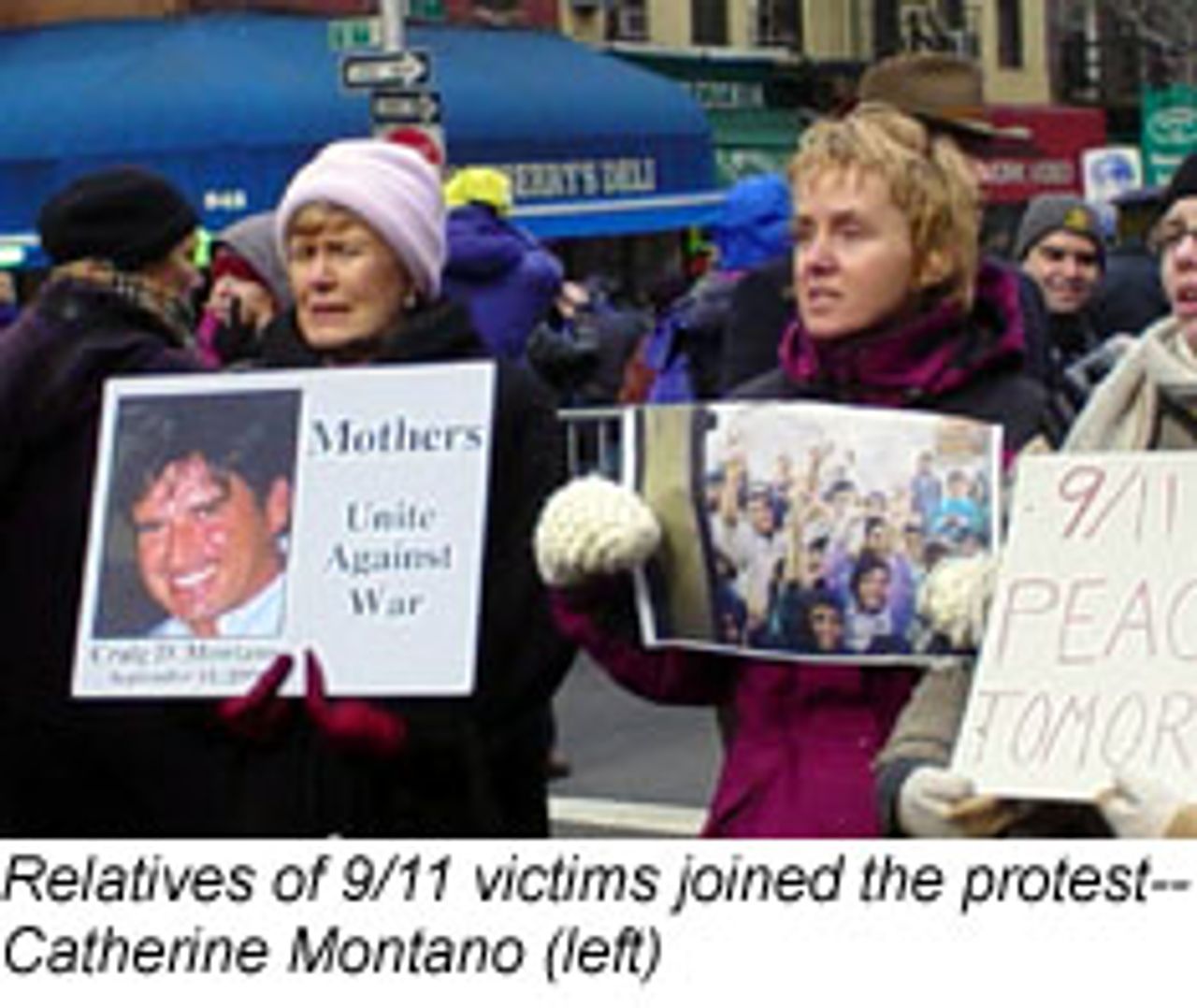Hundreds of thousands of people rallied on Manhattan’s East Side February 15. Many of them, unable to reach the official rally sites, staged spontaneous protest marches that brought traffic to a standstill throughout much of the city.
 Organizers put the size of the crowd at over 400,000. The tightly packed protesters extended more than a mile up First Avenue, most of them unable to see the platform or hear speakers. Counting the many more who were never able to reach the rally site, those who took to the streets may well have numbered over a half million.
Organizers put the size of the crowd at over 400,000. The tightly packed protesters extended more than a mile up First Avenue, most of them unable to see the platform or hear speakers. Counting the many more who were never able to reach the rally site, those who took to the streets may well have numbered over a half million.
After denying the protest’s organizers a permit to march past the United Nations, police erected steel-barricaded pens up the length of First Avenue, beginning several blocks north of the UN building. As the block-long pens filled up, police barricaded the blocks leading into the avenue, forcing those trying to join the protest to walk further and further north just to reach it.
The NYPD was clearly unprepared for the size of the protest, and thousands of people ended up spilling onto Second Avenue, Third Avenue and finally Lexington Avenue, paralyzing nearly half of the island. Authorities were forced to shut down the 59th Street bridge, a major artery bringing traffic in from Queens and Long Island. Much of the East Side Highway was also brought to a halt.
 Over 200 protesters were arrested in clashes with riot-helmeted and mounted police brought in to clear the streets. On Third Avenue, crowds coming out of the subway station joined with others who had been pushed back by police and prevented from reaching the rally until thousands blocked the streets. Demonstrators surrounded a truck carrying police barricades, mounting it and waving banners and signs bearing antiwar slogans until police used nightsticks to force them off.
Over 200 protesters were arrested in clashes with riot-helmeted and mounted police brought in to clear the streets. On Third Avenue, crowds coming out of the subway station joined with others who had been pushed back by police and prevented from reaching the rally until thousands blocked the streets. Demonstrators surrounded a truck carrying police barricades, mounting it and waving banners and signs bearing antiwar slogans until police used nightsticks to force them off.
While the police and the city administration of billionaire Republican Mayor Michael Bloomberg claimed that their denial of the march permit was motivated by security concerns, the net effect of this undemocratic ban was chaos in the streets of New York and a distinctly rebellious mood among many of the students and others who stood their ground against the cops. Few of the arrests would have taken place but for the ban on marching.
 Among those joining the rally on First Avenue were a group of relatives of people killed in the September 11 terrorist attacks. Catherine Montano’s son Craig, employed by the Cantor Fitzgerald brokerage house, was on the 84th floor of the World Trade Center when it was struck by a passenger jet.
Among those joining the rally on First Avenue were a group of relatives of people killed in the September 11 terrorist attacks. Catherine Montano’s son Craig, employed by the Cantor Fitzgerald brokerage house, was on the 84th floor of the World Trade Center when it was struck by a passenger jet.
“This is something I feel I have to do,” she said. “We cannot have wars in this day and age; it will just cause more and more deaths and more mothers who will lose their sons. If my son were alive, he would have been here too. So they can’t do this in his name.”
Valerie Lucznikowska lost her nephew, Adam Arias, an employee at Eurobrokers in the Twin Towers. “We believe no one else should have to suffer the way we have suffered, and that our suffering should not be used to justify an unjust war,” she said. “I see no relation between September 11 and a war in Iraq. Most of the people on those planes were from Saudi Arabia. Their government refuses to cooperate in any investigation and ours just doesn’t want to pursue it. I still don’t think we know what really happened on that day.”
Jaime, a Vietnam veteran, came to the demonstration in his old Marine Corps uniform. “The only lesson from Vietnam is that you have to fight for peace, acceptance and cooperation,” he said. It bothered him that Bush and all those in the Defense Department who are the most vocal proponents of a war against Iraq had actively sought to avoid military service in the Vietnam War.
“If you had been to war and seen death, it would make you want to fight for peace,” he said. “We call them chicken-hawks, because they were chickens then, when it was their time to serve, but now they want to send other people’s children off to fight and die.”
Wounded in combat in Vietnam, Jaime warned that a war in Iraq would have a catastrophic impact on an entire generation of Americans. “It happened in Vietnam,” he said. “In the last Persian Gulf War, you had few casualties, but there are staggering numbers of vets who have service-related disabilities. And that does not include the emotional and psychological toll of war.”
Joe from Queens, 40, joined the rally. “I came here because of the prospect of thousands of innocent people dying for all the wrong reasons,” he said. “The real reason is to control that oil as a geopolitical ploy to dominate the global scene.”
Carranza, a member of the International Brotherhood of Electrical Workers Local 3, said he had little confidence that the massive turnout would influence the policy of the Bush administration. “We don’t live in a democracy,” he said. “Both domestic and foreign policy are heavily influenced by the military-minded people that own our government and manipulate the national media. The domestic policy, such as tax cuts for the rich at a time when working people are struggling, is a major source of outrage for the American people.”
“The US is going to bomb Baghdad—a modern city like New York—and kill thousands and thousands of civilians,” said Bob, a water department worker who came to the demonstration from Boston. That’s unbelievable terror and they are going to call it collateral damage. This is after they have denied food and medicine to the Iraqi people.
“In America people are going without jobs,” Bob added. “Every time I read a paper this or that company is laying off 20,000 or 30,000 people. Mothers with two or three kids are exhausting their two-year limit on welfare and being tossed into the streets with no income. This has to stop.”
There was no perspective advanced from the platform of the demonstration to carry forward a struggle against war. Most of the speakers attempted to foster illusions in both the Democratic Party and the United Nations as foundations for opposing the Bush administration.
One of the principal speakers was Archbishop Desmond Tutu of South Africa, who told the demonstrators that just as “people marched and demonstrated ... and communism ended,” so marches and demonstrations could end war. Tutu, who received a Nobel Peace Prize for preaching against “violence” by the black majority of South Africa to end the apartheid regime, said that a “just war” against Iraq could only be one sanctioned by the United Nations Security Council, which he said would be a “legitimate authority” to authorize such an attack.
Several Democratic Congressmen—Dennis Kucinich of Ohio, Sheila Jackson Lee of Texas and Nydia Velasquez of Brooklyn, New York—also addressed the crowd, along with Al Sharpton, who has announced his campaign for the Democratic presidential nomination. None of them were able to present any serious proposal to halt the impending attack on Iraq or even referred to their party leadership’s support for war.
